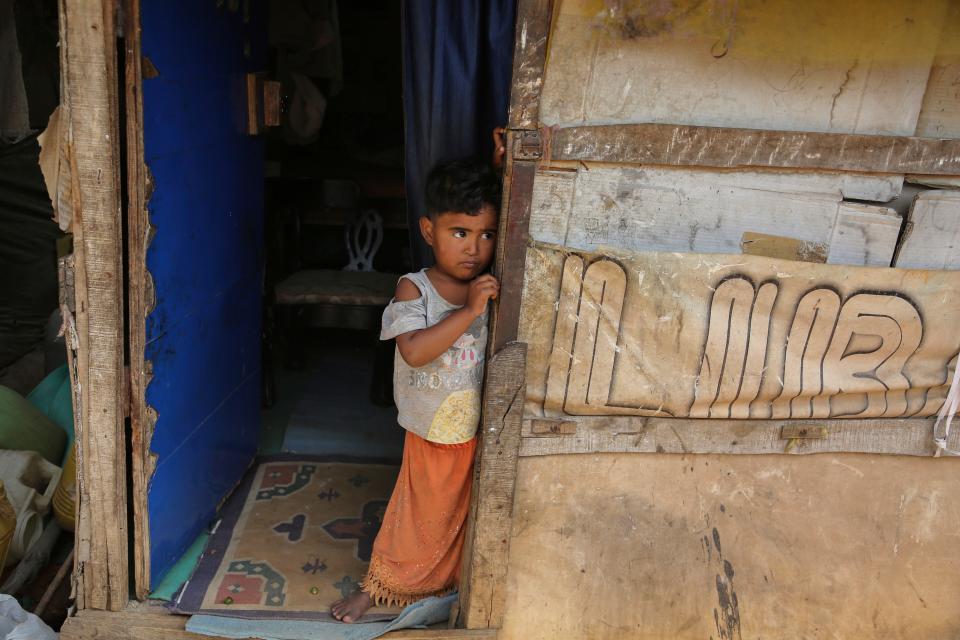This International Women’s Day, let’s give refugee girls a brighter future

For most refugee girls, there’s little to celebrate on International Women’s Day. The pandemic is making a tough life even harder. As I take up a new role as a Goodwill Ambassador for UNHCR, the UN Refugee Agency, I hope we can all start to reflect more on the plight of refugees in general, and girls in particular, and work towards furthering their aspirations for a brighter future.
Movement, migration and refuge are all close to my heart. My maternal grandmother spent her first 13 years in Burma, present-day Myanmar. During the Second World War, her family had to flee, making a treacherous journey back into India, only to face the partition of Pakistan and India, when 15 million people became refugees almost overnight in their own land, and a million died. Many family members were impacted.
I’m British – a proud Yorkshire lass – but I’m also Punjabi and Indian. We all draw on different roots; we all have ancestors who moved around. The Anglo-Saxons migrated from northern Europe, settling in England centuries ago. Some, no doubt, had to leave their lands to seek safety and might have qualified for refugee status, had it existed.
Everyone should try to put themselves in the shoes of someone forced to flee. What would you do if it was your family in that boat? If tomorrow your country was turned upside down, due to conflict, political persecution or another reason? You, too, would want to get somewhere safe so that your family could survive and have a chance of a future. Most people can sympathise with that fear and hope.
Thinking in those terms can help us better understand the plight of those driven from their homes more recently. There’s currently 80 million people – almost equivalent to the population of Germany – forcibly displaced globally. Examples are easy to find: look at the Sahel, Syria, Afghanistan, Myanmar, Ethiopia or Venezuela. The Central African Republic is just the latest country to descend into instability, triggering another flight to safety. We are not finding solutions to conflicts, old or new. If anything, things seem to be tilting the other way.
And now, across societies, Covid-19 is not discriminating. Yet it is hitting the marginalised hardest. And in that group you can place refugees. For many of them, the pandemic is merely another crisis to contend with on top of poverty, destitution and abuse. In the Middle East and North Africa, 1.1 million Syrian refugees and internally displaced Iraqis have been pushed deeper into poverty by Covid.
The pandemic’s impact on refugee women is especially worrisome. It has reduced access to education for 90 per cent of refugee children, with older girls particularly at risk of dropping out permanently. As primary caregivers, women are also feeling the extra burden of supporting families, and they are more likely to hold precarious informal jobs, which are evaporating. Incomes are projected to drop by 82 per cent in countries where most forcibly displaced populations are located.
The pandemic and related movement restrictions have also heightened existing risks of gender-based violence, especially intimate partner abuse, as well as the scourge of sexual exploitation. Life-saving face-to-face services have had to be limited, space safe spaces have been shuttered, hopefully temporarily. Evidence from across Africa, eastern Ukraine, Bangladesh and Colombia shows rising violence against displaced women or a diminished sense of safety. By the end of 2020, 27 UNHCR operations had reported an increase in gender-based violence. There is also greater risk of child marriage, early pregnancy and exploitation for displaced adolescent girls.
When visiting refugees, it is the women I have met who left the most indelible impressions. In Zaatari, the largest camp in Jordan and the Middle East, I met Khaldieh, then 18. She was desperate to be a journalist and was fighting tooth and nail to create and print her own newspaper. She was determined to use whatever tools she had to empower women and educate men within that community.
I often draw inspiration from Kadiya, and marvel at her drive to push ahead and educate herself for a better life. It’s a story that is repeated across the world in camps and informal settlements on the fringes of society. Refugees have no choice but to believe that things will improve. And the rest of us can learn from that. We have to believe that the pandemic will pass and we can all move forwards.
In the meantime, I hope to use this platform to help tell more stories. But it’s not only those with a public profile who can help. The public can, too, by donating, or writing to policy makers to urge greater international burden sharing, or volunteering time to help local organisations help refugees get back on their feet.
I feel it’s really important to shine a light on causes that are close to my heart and my roots. That is exactly what I plan to do with UNHCR.
Anita Rani is a UK-based TV and radio broadcaster. She was recently named a UNHCR Goodwill Ambassador
Read More
The pandemic of inequality: How coronavirus is setting women’s rights back decades

 Yahoo Finance
Yahoo Finance 